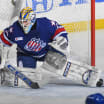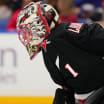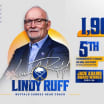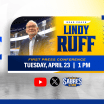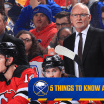On the first day of training camp, Jack Eichel stepped to the podium and declared a new standard had been established for the Buffalo Sabres. Then, one-by-one, his teammates echoed the sentiment.
"Vulnerability" was a recurring word that day. Players expressed that they had broken barriers and communicated at a more honest level than ever before, with their sights set on establishing a new culture and leaving a string of disappointing seasons in the past.
After three weeks of training camp, the results have been noticeable.
Honesty, accountability brought Sabres closer in camp
Offseason exercises have led to changes in camp

© Len Redkoles/Getty Images
"I think just through the vibe and the atmosphere around the room, it's clearly apparent," veteran forward Jason Pominville said. "I think some of the open conversations that we were able to have has kind of helped us create tighter bonds and that's kind of what it's all about."
The conversations Pominville and others have referenced occurred in late August, just before the preseason began, when the team's leadership group - including Pominville, Eichel, Kyle Okposo and Zach Bogosian, among others - took part in exercises aimed to put them in vulnerable situations.
The players put it all on the table, picking apart what they thought needed to change to right the ship coming off a last-place finish.
"We did some stuff team-wise, leadership-wise, and I think that's when it really started to snowball," said goaltender Carter Hutton, an addition made over the summer who's already established a voice in the Buffalo dressing room.
"It's easy to talk about, obviously. We need to win games and play. But from a standpoint of before the season, I thought it was a great step forward of opening up and getting this team, being able to translate what goes on at the rink off the ice, being open and not being defensive about stuff."
The result has been a dressing room that's always considered itself tight-knit being closer than before.
"It's always been close, but it's got to be close the right way," defenseman Rasmus Ristolainen said. "It's been close every year, but maybe not the way that we get the best out of each other individually and as a team, holding everyone accountable.
"It's close this year but we've been talking about reality and what we want. We are straight with everyone right away from the start. I feel like the environment right now is that we can be honest with each other and hold each other accountable."
Player-to-player accountability was called into question last season by veterans who felt that bad habits or misplays tended to go unchecked. The exercises by the leadership group were part of an effort to break barriers so that those conversations can be held throughout the season.
Sabres coach Phil Housley said last season that his team too often broke at the face of adversity. The internal belief now is that when rough patches strike, they'll be better equipped to address the areas in need of change.
"It's not easy to hold people accountable but accountability is such an important thing in a room," Eichel said. "I think we learned that we've got to have tough skin and there's going to be times when you've got to say something. It's important that people take it the right way and take it with the right intentions.
"We've worked a lot together about being able to do that but also incorporating the rest of the team and making sure we come together as a group. I think the closer we are off the ice, the more it will translate on the ice."
CAPTAINCY: Eichel
The dialogue extends itself to postgame. Housley has begun opening the floor to players to say their piece after games, and just not the leadership group. The hope is that all 23 voices are heard as the season progresses.
"You can tell, guys are owning up to bad plays," Hutton said. "It's not the end of the world, but it's a thing of having the common sense not to blame anybody else and understand that when you need to be better, we need you to be better. At the same time, it's knowing that if someone says something to you not to take it the wrong way. Everything is for the better of the team here."
"We're talking more after games, we're talking more overall about real things - not about weather or football," Ristolainen added. "I mean that's hockey still, but now we have real conversations about getting better and pushing each other forward."
The players established their own credo that hangs over the entrance of the dressing room: All in, All out, All the time. It's the way they've begun to approach practice since before the season began, with informal sessions at Harborcenter dating back to mid-August.
Those skates were needed preparation for camp, which Housley promised would be difficult in his exit meetings with players in April.
"Our first few days, especially when we started camp, were probably one of the hardest couple days I've ever been a part of in training camp," Pominville said. "We were really able to push it hard early, and then obviously he had to back off a little bit because of the games. But when he's had the chance to push us, he always did.
"I think we're going to benefit from it. It's kind of cliché to say you play like you practice, but I really believe in it and I think everyone believes in it. At times last year, I think we weren't practicing at a quick enough, fast enough pace and it led to us not being able to play the way that we should. And now by practicing that way, it just gets you readier for those game situations."
If someone's not pushing the pace, they hear about it.
"During the practice, when we are on the ice, executing and work hard and then if something happens can talk, or you can talk after if you saw something out there," Ristolainen said. "I think we can work much harder. We've been pushing and trying to reach our limits every day.
"If you're not feeling at your best, still give all you got."
The Sabres will put their work to the test for the first time in their season opener against the Boston Bruins on Thursday night. A win would be significant for a team looking to start strong and put past October struggles behind them.
But a loss can't take them off the tracks, either.
"We've done a lot of hard work," Eichel said. "A lot of thought went into this and what we as a group need to stand for and what we want this organization to stand for. It's not a finished product, by any means. It's going to continue to get better.
"We know we're going to face adversity and there's going to be times when things aren't going well for us as a group. It's all about how we respond. With the training that we've had and the talks we had, I think if we face adversity the right way then we'll be able to overcome it."

